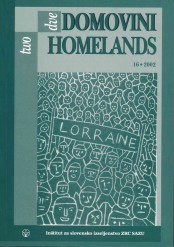Connecting of Slovenes around the woeld with the Help of the Internet: Establishing Virtual Ethnic Communities
Abstract
The present text problematises the connecting of Slovene emigrants abroad among themselves and with the homeland. Connecting in the era of rapid development of informational communication technology is given new dimensions, which we here attempt to enlighten. Through the sociological viewpoint on diaspora we present the life of the individual in diaspora, resorting to the division of the viewpoint of the individual, and the viewpoint of the emigrant community. Thus we try to deal with the life of emigrants through seeking connections between the following dimensions: being integrated into an environment, mastering Slovene language, preserving ethnic identity, need for ethnic socializing, nostalgia of the individual and least but not last the activeness of part-taking in virtual ethnic communities. With the help of theoretic stand-points we define the mentioned connections and empirically verify them. Presented are the results of the poll, which the emigrants answered over the internet. We ascertain that a statistically typical connectedness exists between the activeness of cooperating in virtual ethnic communities and the degree of integratedness of an individual into the environment in which one at present lives, the need for ethnic socializing, and the nostalgia of the individual. On the basis of collected data we attempt to deduce on actual existence of Slovene virtual ethnic communities.
Downloads
References
Clifford, J. 1994. Diasporas. V Cultural anthropology, let. 9, št.3, str. 302-338.
Dayan, D. 1998. Media and diasporas. V Media, ritual, identity, ur. Curran in Liebes, str. 18-33, London: Routledge
Elkins, D. 1997. Globalisation, telekomnikations and virtial ethic communities. V International Political science review, let. 18, št. 2, str. 139-152.
Ferligoj, A. Prosojnice pri predavanjih M ultivariatne analize (skripta). Samozaložba.
Ferligoj, A.,Leskovšek, K.,Kogovšek, T.1995. Zanesljivost in veljavnost merjenja. Fakulteta za družbene vede, Ljubljana.
Holmes, D. 1977. Virtual politics: Identity and Com m unity in Cyberspace. London: Sage
Jones, S. (ur.). Doing Internet research : Critical Issues and M ethodes for Examining the Net, 203-220. SAGE, 1999, London.
Južnič, S. 1993. Identiteta. FDV, Ljubljana.
Kropivnik, S. Prosojnice pri predavanjih Tržno raziskovanje (skripta). Samozaložba.
Lukšič-Hacin, M. 1995. Ko tujina postane dom. ZPS, Ljubljana.
Lukšič-Hacin, M. 1999. Procesi resocializacije in etnična identiteta. V: Teorija in praksa, let. 36, št. 2, str. 274-289.
Pavlik, J. 1998. New Media Technology: Cultural and Commercial Perspective. Columbia: Columbian University.
Rheingold, H. 1991. The virtual reality. Routledge, London.
Skrbiš, Z. 1998. Making it treadable: videotapes, cultural technologies and diasporas. v Cultural studies, št. 12, str.265-273.
Toš, N., Fink-Hafner, M. 1997. Metodologija družboslovnega raziskovanja. Fakulteta za družbene vede, Ljubljana.
Turkle, S. 1995. Life on Screen. New York: Simon & Schuster.
Ule, Rener, Mencin-Čeplak, Tivadar, 2000. Socialna ranjivost mladih. Aristej, Ljubljana.
Van Cuilenburg, J. 1999. On competition, access and diversity in media, old and new, some rem arks from com m unications policy in the inform ation age. V New Media&Society, let. 1, št.2, Avgust 1999. str. 184-188.
Vehovar, V. 1998. Internet v Sloveniji. Fakulteta za družbene vede. Ljubljana.
Verhulst, Stefan. 1999. Diasporic and transnational communication: technologies, policies and regulation, v Javnost (the public), let. 6, št. 1 str. 26-36.
Wilbur, P.S. 1996. »An Archeology of Cyberspaces: Virtuality, Community, Identity«. V Porter, D. (ur.). Internet Culture, 5-22. London: Routledge.
Downloads
Published
How to Cite
Issue
Section
License

This work is licensed under a Creative Commons Attribution-NonCommercial-NoDerivatives 4.0 International License.
Authors guarantee that the work is their own original creation and does not infringe any statutory or common-law copyright or any proprietary right of any third party. In case of claims by third parties, authors commit their self to defend the interests of the publisher, and shall cover any potential costs.
More in: Submission chapter





